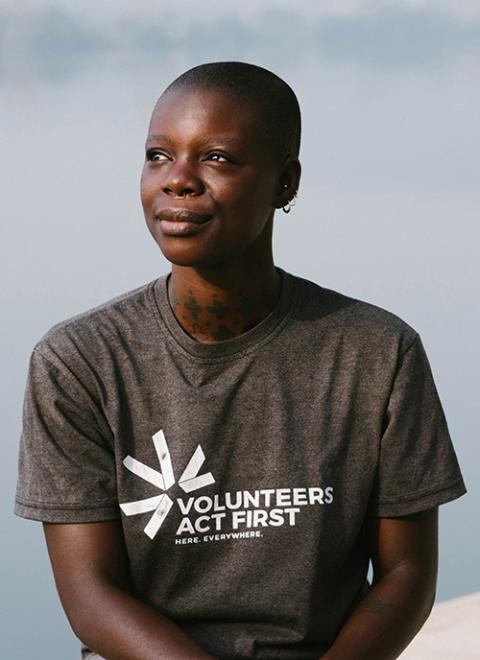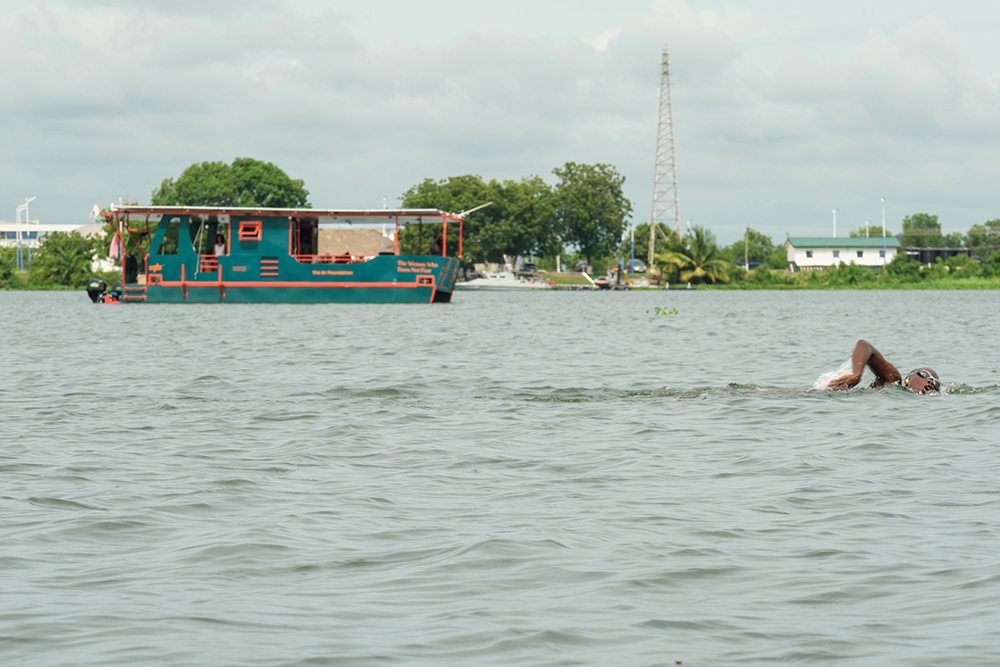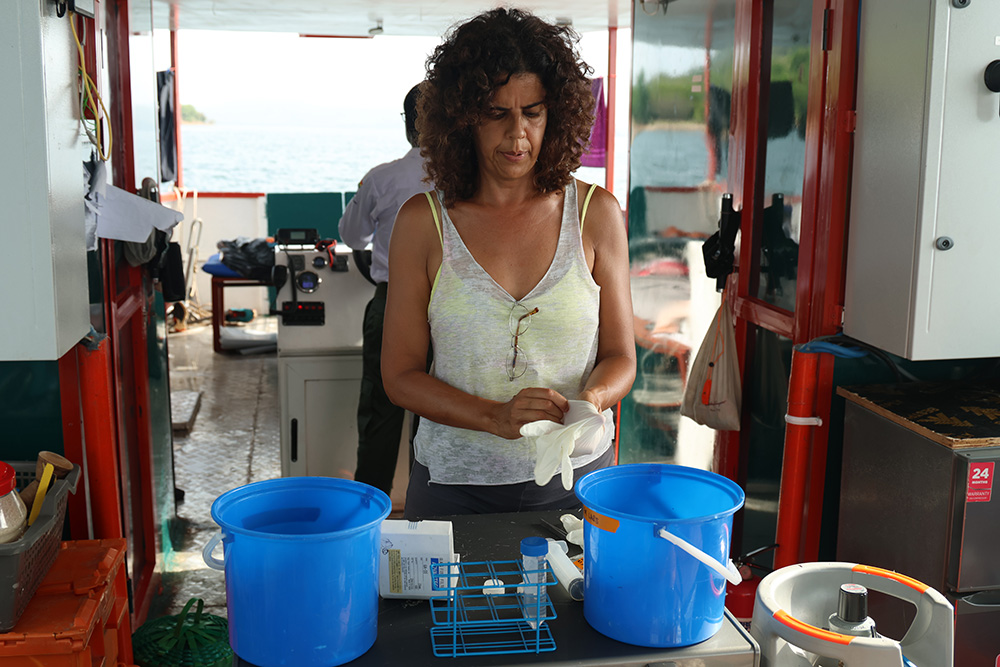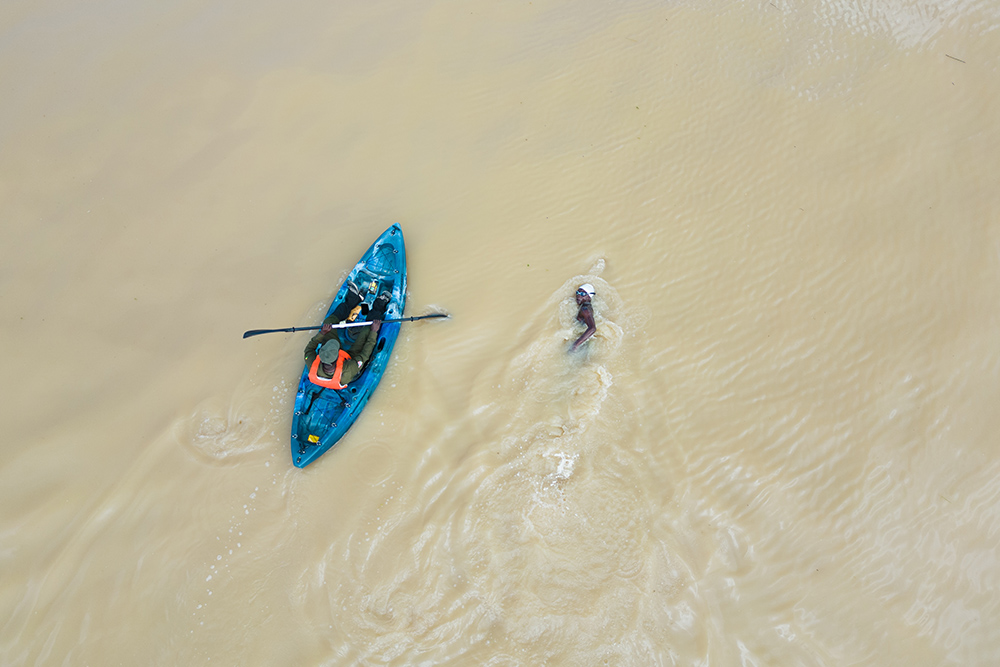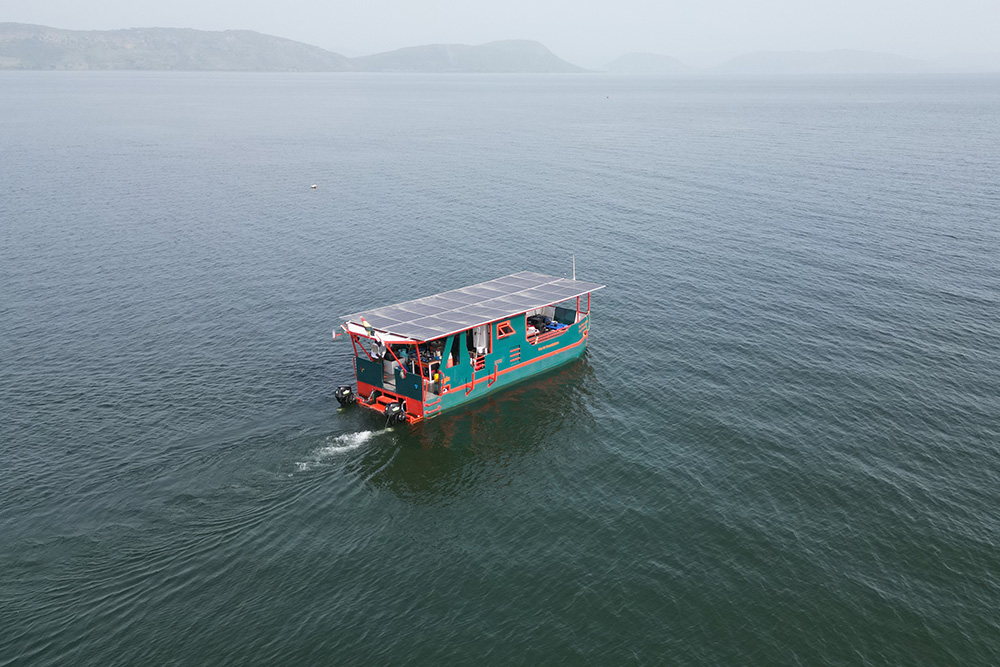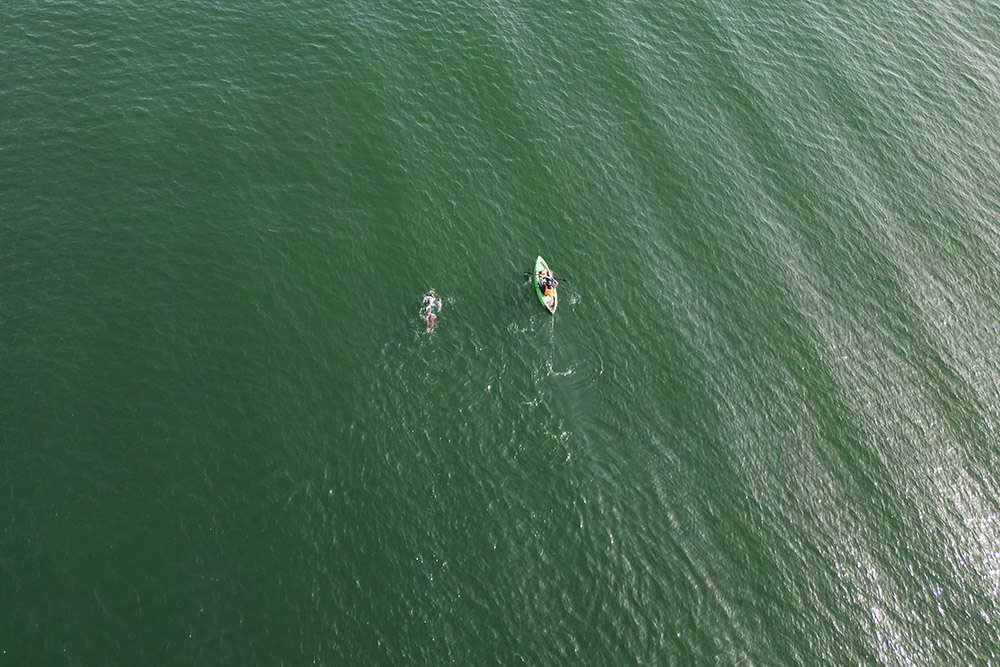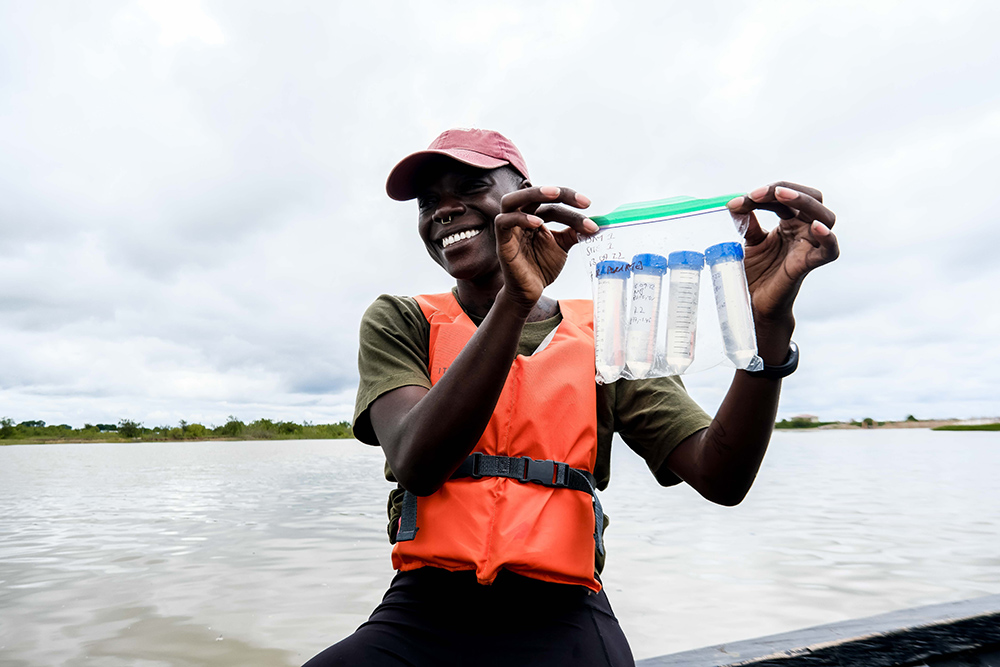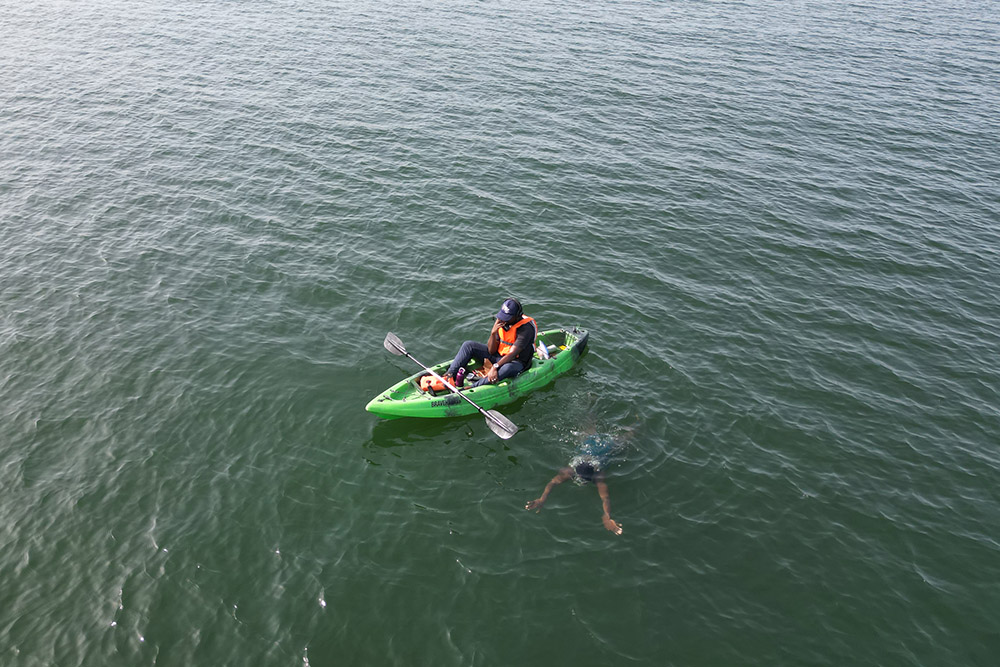
A member of the Agbetsi Living Water Swim expedition crew radios other crew members with a status update while paddling alongside Yvette Tetteh as she swims in the Volta River in Ghana. (Courtesy of the Or Foundation)
In March, Ghanaian-British athlete Yvette Tetteh announced her commitment to swim 450 kilometers down the Volta River, a major river system in Ghana. The activist and agribusiness leader swam under the auspices of the Or Foundation, which has long documented the environmental impacts of secondhand clothing imports to the region.
Motivated to monitor clothing's contribution to water pollution, the organization — based in Accra, Ghana's capital city — launched a campaign and scientific expedition called Agbetsi Living Water Swim to document the impacts of textile waste on the Volta River. The expedition crew collected water and air samples in an aluminum, solar-powered catamaran called The Woman Who Does Not Fear, which came equipped with a science laboratory in which to conduct water and air sample analysis.
Tetteh, who is a member of the Agbetsi Living Water Swim expedition crew and a board member of the Or Foundation, began her swim on March 7, starting in the town of Biupe in North Ghana. Every day, she swam four to six hour's worth of the river, flanked by a kayaker, who along with the catamaran crew collected samples.
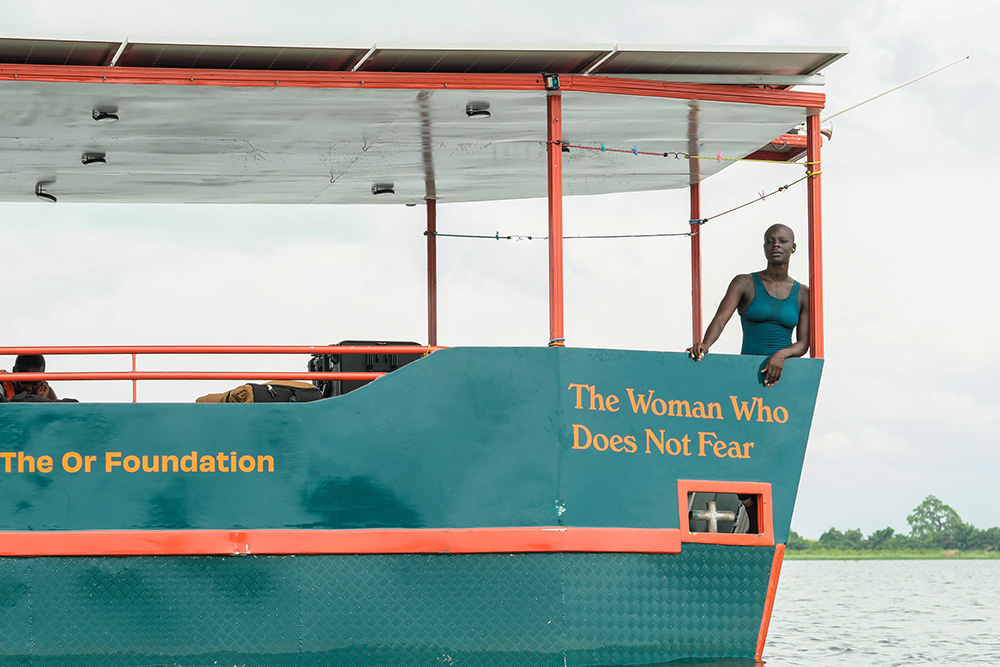
Ghanaian-British swimmer Yvette Tetteh poses on the research vessel "The Woman Who Does Not Fear," an aluminum, solar-powered catamaran equipped with a science laboratory. (Courtesy of the Or Foundation)
Tetteh, too, collected samples, wearing an anklet equipped with a water sampling device.
With every swim stroke, she and the crew accumulated information about the contents of the river — and the chemicals and microfibers swirling around her body and the boat. At the close of each day, Tetteh and the crew spoke with community members who gathered to marvel at their strides.
Water is the lifeblood of earthly existence, covering 70% of the planet and making up over half of our bodies. Water plays a key role in community health, and waterways reflect the health of local environments and communities.
What can waterways teach us about our (dis)regard for community and environmental health — and how to right wrongdoings?
The swim expedition, which concluded on May 16, broke numerous milestones as the longest swim in Ghanaian history and employed the first solar-powered research vessel in Ghana.
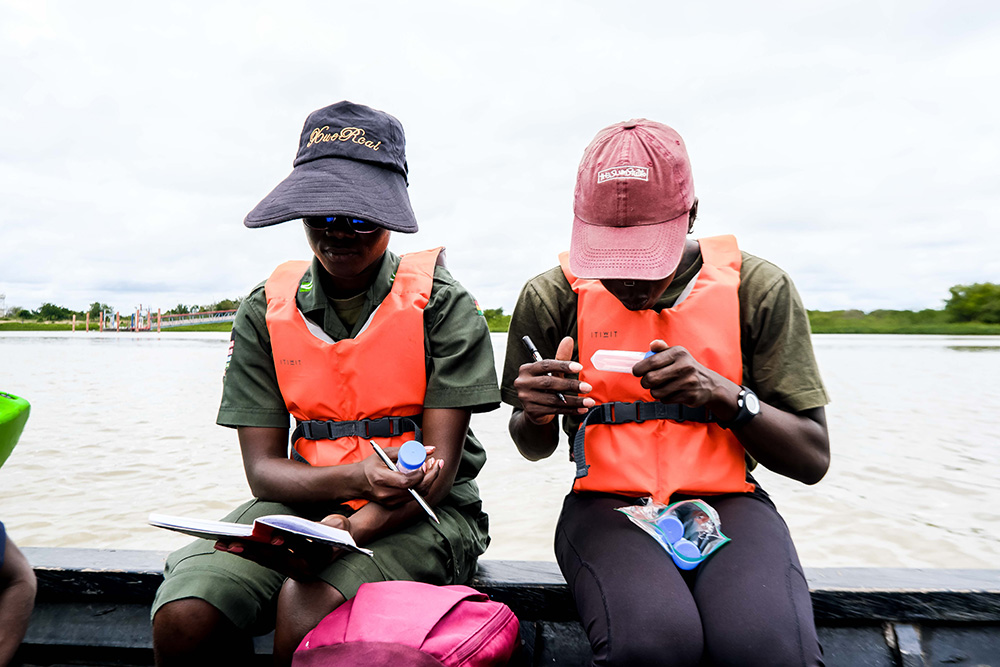
Agbetsi Living Water Swim expedition crew members note down sampling data. (Courtesy of the Or Foundation)
This expedition also broke ground in advancing research and education about waste colonialism, high-GDP countries dumping waste into low-GDP countries. Through this practice, communities and their lands are dominated by disposal of waste from the Global North.
An innocuous, seemingly innocent way that countries in the Global North contribute to waste colonialism is through clothing donations. When consumers donate excess clothing, many might hope it ends up with families in need. But more often than not, clothing excesses — from secondhand donations to thrift store castoffs to deadstock from apparel brands — end up crowding the waterways of other countries, like Ghana.
Ghana imports a staggering 15 million pieces of clothing every week. In the Kantamanto Market, the largest secondhand clothing market in West Africa, workers sort through bales of imported clothing castoffs to separate items suitable for resale from those that are tattered, stained and unable to be resold. Despite even the best efforts to repair and repurpose secondhand garments, 40% of clothes end up in landfills that spill onto Ghanaian shorelines.
While countries like the United States ship their excesses abroad, countries like Ghana are left to bear the consequences, at great economic and environmental cost. A February 2022 video by Insider Business broadcast the extent of the damage: shorelines across Ghana, littered with hundreds of "tentacles" of tattered clothing. Less visible, yet no less damaging, are the microfibers sloughed from these castoffs and settling in the water, worsening the country's water quality.
The Global North has long practiced waste colonialism by foisting electronic waste, plastic waste and now clothing waste on the Global South. These practices implicate countries, corporations and, to a lesser degree, consumers, in ecological sin — carelessly affronting God's creation and creatures with degradation.
Catholics often reflexively donate clothes as a corporal work of mercy to clothe the naked. This act addresses an actual and immediate need in local communities, but when the faithful's idea of "clothing the naked" is to drop bursting donation bags at the nearest thrift store, the act bears more harm than good. Well-meant donations that offload one groups' excesses to be dealt with by another enable unsustainable patterns of overconsumption — and disproportionately harm already vulnerable communities hundreds of miles away.
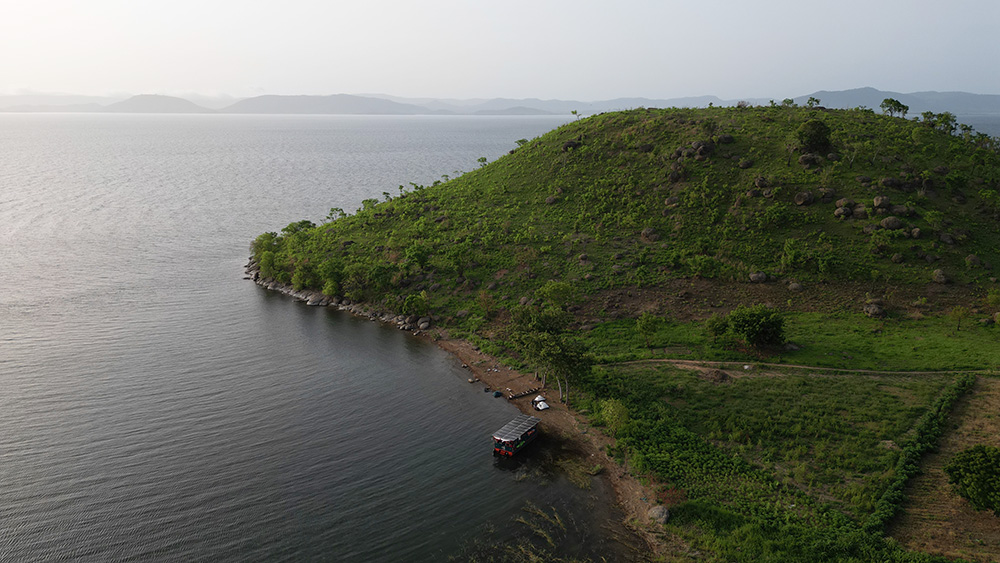
"The Woman Who Does Not Fear" docks in a bay along the Volta River in Ghana. (Courtesy of the Or Foundation)
From the tangled textile ropes on beaches, foundation members have pulled T-shirt scraps bearing the names of North American universities, small businesses and, ironically, eco-friendly slogans.
Tetteh shared feelings of grief when faced with the expansiveness of this environmental harm. Writing for Atmos prior to the expedition's start, she detailed her witness to plastic and textile waste clogging the inner-city shanty towns of Accra.
"It is overwhelming. And it speaks to a collective fear we all hold ... the dread of powerlessness," she said.
Without purpose, Tetteh notes, "We return to this feeling of powerlessness — an emotion that in the Global North is often overcome through overconsumption. We consume work to keep our minds busy; we consume goods to keep ourselves busy; and many of us consume stories about recycling and charity shops that obscure 'poor people' recipients in order to keep us from asking why we're even in this exhausting cycle of working-to-consume in the first place."
This cycle is in the service of obscuring the costs of overproduction — economic, environmental and spiritual.
A swim expedition in response to these harms might appear inconsequential — but for Tetteh, it was a guiding force: "There is no control in this experience, only awareness and intention — which is not dissimilar, I think, from what is required of us to move through life with compassion and purpose; and to put a stop to waste colonialism."
In her essay for Atmos, Tetteh unabashedly admits her intimidation at the prospect of the swim, and the fears generated by the expanse of textile pollution in Ghana. Yet she also speaks of faith.
Advertisement
"Faith is on the other side of fear. Faith bridges the present to a future you want to see, and renders it achievable," she said, adding that faith drives the Or Foundation's work.
Though the swim expedition has concluded, the work of the Or Foundation continues. The research results of Agbetsi Living Water Swim, including 290 water and air samples from across the Volta River, will influence future organizational efforts to implement an extended producer responsibility (EPR) policy and hold corporations responsible for the impacts of their overproduction.
Tetteh anticipates this work will also secure respect and financial resources for communities that are burdened by clothing waste from the Global North.
Tetteh's training for the swim heightened her awareness of her local environment, and the beauty it houses. "To see the glassy waters of the Volta gently marbled by the wind and sun is a balm for the spirit," she said. These and other tender sights are, for her, "reminders that I am ready to move through fear, and pain, and exhaustion, with the faith and the embodied knowledge that it is worth it."
The strides of Tetteh and the Agbetsi Living Water Swim may give members of the Global North pause and inspire Catholics to restructure their own strides to more accurately live out the works of mercy — away from incessant consumption toward slower, more sustainable modes of being for everyone.
Greater support for those suffering from waste colonialism and textile pollution might look like amplifying the work of organizations like the Or Foundation or supporting communities like Kantamanto through efforts such as the Secondhand Solidarity Campaign, joining voices from oceans away.

